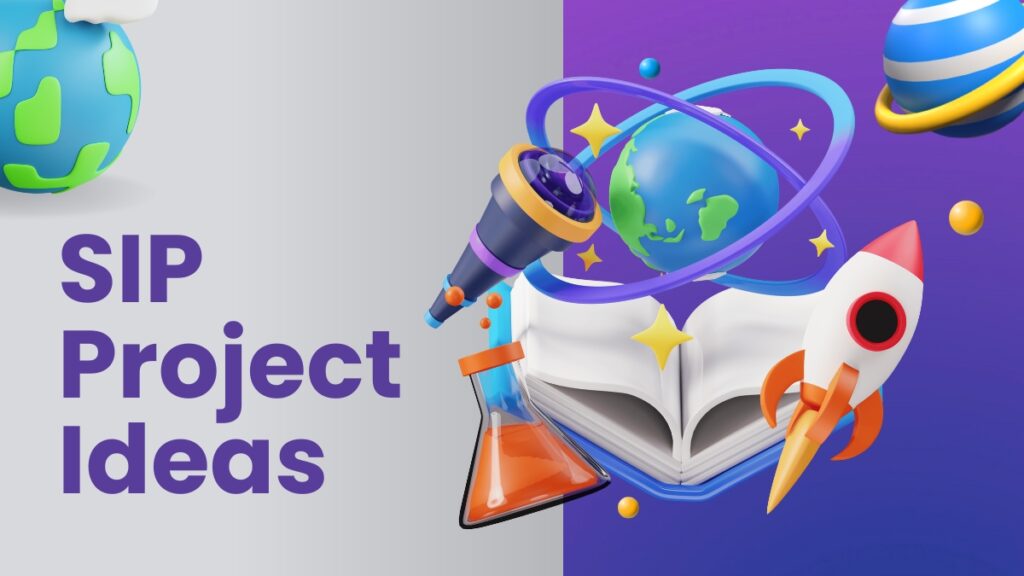Uncover fascinating SIP project ideas designed to ignite your scientific curiosity and enhance your skills. Dive into engaging projects spanning biology, physics, chemistry, and beyond!
A Science Investigatory Project (SIP) is an enjoyable, hands-on approach for students to delve into the world of science. This blog post will guide you in finding and undertaking exciting SIP projects.
From biology and physics to chemistry and more, there’s a project out there that will capture your imagination. Let’s explore some compelling ideas across various scientific disciplines together!
SIP Project Ideas PDF
What is a Science Investigatory Project (SIP)?
A Science Investigatory Project (SIP) is a hands-on way for students to explore scientific questions. It involves running experiments, collecting data, and analyzing results. SIPs boost critical thinking, problem-solving, and creativity while deepening your scientific understanding.
In short, it’s a mini-research project to fuel your curiosity and build scientific skills.
Objectives of an SIP
A Science Investigatory Project (SIP) helps students:
| Aspect | Description |
|---|---|
| Ask Questions | Formulate and test scientific questions. |
| Solve Problems | Develop and test solutions. |
| Think Critically | Analyze and evaluate information. |
| Be Creative | Explore new ideas and approaches. |
| Research | Conduct and present research. |
| Communicate | Share results clearly. |
| Work Together | Collaborate with others. |
SIPs build skills for academic and professional success.
SIP Project Ideas
Check out SIP project ideas:-
Biology
- Plant Growth: Test effects of different fertilizers.
- Microbiology: Study bacteria resistance to antibiotics.
- Genetics: Explore inheritance in plants.
- Botany: Investigate plant responses to light.
- Animal Behavior: Observe effects of environment on animals.
- Photosynthesis: Measure photosynthesis rates in plants.
- Ecology: Study impact of invasive species.
- Human Anatomy: Measure exercise effects on heart rate.
- Soil Quality: Analyze soil types and plant growth.
- Nutrition: Examine effects of different diets on animals.
Physics
- Optics: Experiment with lens types.
- Mechanics: Analyze projectile motion.
- Electronics: Build a basic circuit.
- Sound Waves: Study sound travel through materials.
- Thermodynamics: Test heat conduction in materials.
- Magnetism: Measure magnetic field strength.
- Forces: Explore friction on various surfaces.
- Gravity: Use pendulums to measure gravity.
- Fluid Dynamics: Study liquid flow through nozzles.
- Waves: Examine standing waves in mediums.
Chemistry
- Water Quality: Test drinking water for contaminants.
- Organic Chemistry: Synthesize and test esters.
- Inorganic Chemistry: Study metal reactions with acids.
- Biochemistry: Measure enzyme reaction rates.
- Polymer Chemistry: Create and test biodegradable plastics.
- Acid-Base Reactions: Investigate neutralization reactions.
- Electrochemistry: Test electrolytes in batteries.
- Chemical Kinetics: Study temperature effects on reaction rates.
- Spectroscopy: Analyze substance absorption spectra.
- Chemical Synthesis: Create new compounds and test properties.
Environmental Science
- Air Quality: Measure pollution levels.
- Waste Management: Study recycling vs. composting.
- Climate Change: Analyze local climate impacts.
- Biodiversity: Survey species in an ecosystem.
- Water Pollution: Test for pollutants in water bodies.
- Ecosystems: Study habitat destruction effects.
- Energy Efficiency: Compare appliance energy use.
- Conservation: Explore methods to preserve species.
- Sustainable Practices: Investigate sustainable farming techniques.
- Land Use: Study urbanization’s impact on wildlife.
Earth Science
- Geology: Examine rock types and formations.
- Meteorology: Track and analyze weather patterns.
- Fossils: Study local fossils and their types.
- Natural Disasters: Analyze recent earthquakes’ effects.
- Soil Erosion: Investigate erosion control methods.
- Volcanology: Study volcanic activity.
- Mineralogy: Test mineral hardness and properties.
- Hydrology: Measure river flow rates.
- Glaciology: Explore glacier melting effects.
- Tectonics: Study landform changes from tectonic activity.
Computer Science
- Algorithms: Test sorting algorithms.
- Software Development: Create a simple app.
- Cybersecurity: Explore common online threats.
- Data Analysis: Analyze data trends.
- AI: Train a basic image recognition model.
- Networking: Set up a secure local network.
- Game Development: Design a basic game.
- Database: Create a simple database system.
- Web Development: Build a basic interactive website.
- Automation: Write a script for repetitive tasks.
Engineering
- Robotics: Build a basic robot.
- Renewable Energy: Design a small solar or wind system.
- Structures: Test different bridge designs.
- Materials Science: Experiment with new materials.
- Fluid Mechanics: Build a hydraulic lift model.
- Thermodynamics: Test a heat exchanger model.
- Mechanical Design: Create a working mechanical system.
- Civil Engineering: Study building material impacts.
- Acoustic Engineering: Test soundproofing materials.
- Transportation: Improve transportation system models.
Psychology
- Behavioral Studies: Analyze effects of rewards on behavior.
- Cognitive Processes: Study memory techniques.
- Social Psychology: Explore group decision-making.
- Developmental Psychology: Investigate child development stages.
- Emotional Response: Study music’s impact on mood.
- Perception: Explore visual illusions.
- Stress: Measure stress effects on performance.
- Personality: Examine personality traits and behavior.
- Motivation: Study effects of goal setting.
- Learning Styles: Compare different learning methods.
Benefits of participating in SIPs
Participating in Science Investigatory Projects (SIPs) helps students:
Here’s the information in a tabular format:
| Aspect | Description |
|---|---|
| Understand Science | Learn scientific concepts and methods. |
| Think Critically | Analyze and solve problems. |
| Improve Research | Collect and analyze data. |
| Experiment | Conduct and observe experiments. |
| Communicate | Present and write reports effectively. |
| Collaborate | Work well with others. |
| Be Creative | Think and solve problems creatively. |
| Prepare for Careers | Get ready for college and future jobs. |
| Grow Personally | Build confidence and perseverance. |
SIPs offer valuable skills that extend beyond the classroom.
Importance of SIPs in scientific learning
Science Investigatory Projects (SIPs) offer students:
| Skill | Description |
|---|---|
| Real-World Application | Link theory to practice. |
| Critical Thinking | Analyze problems and make conclusions. |
| Research Skills | Collect and interpret data. |
| Problem-Solving | Create innovative solutions. |
| Hands-On Experience | Learn through experiments. |
| Clear Communication | Present findings effectively. |
| Teamwork | Collaborate with others. |
| Curiosity | Encourage ongoing learning. |
SIPs build essential skills for future academic and professional success.
How to choose a suitable SIP topic
Choosing a great SIP topic involves:
Align with Interests
- Passion: Pick something you’re excited about.
- Skills: Match the project to your strengths.
- Career Goals: Choose something that supports your future plans.
Identify a Real-World Problem
- Social Impact: Focus on societal issues.
- Industry Needs: Look for market gaps.
- Personal Experience: Use your own experiences for inspiration.
Assess Feasibility
- Resources: Check if you have what you need.
- Time: Ensure the project fits your schedule.
- Expertise: Make sure you have or can gain the necessary skills.
Seek Guidance
- Faculty: Get advice from teachers.
- Industry Experts: Consult professionals.
- Peers: Discuss ideas with classmates.
Consider Impact and Innovation
- Benefits: Look at the potential positive impact.
- Originality: Aim for something unique.
- Practicality: Ensure it has real-world applications.
Consider these factors to choose a SIP topic that’s both engaging and feasible.
Project Planning and Execution
Effective planning and execution are key to a successful Science Investigatory Project (SIP).
Project Planning
- Research Question: Define what you want to investigate.
- Literature Review: Gather background information.
- Hypothesis: Create a testable hypothesis.
- Experiment Plan: Outline your experiment, including variables and procedures.
- Data Collection: Decide how to gather and record data.
- Timeline: Set a project schedule.
- Resources: List needed materials and equipment.
Project Execution
- Conduct Experiment: Follow your plan.
- Collect Data: Ensure data is accurate.
- Analyze Data: Use suitable methods to analyze.
- Interpret Results: Draw conclusions from your data.
- Document: Keep detailed records.
Overcoming Challenges
- Time Management: Allocate time wisely.
- Problem-Solving: Handle unexpected issues.
- Data Analysis: Apply correct tools and techniques.
- Communication: Present findings clearly.
Following these steps will help you successfully complete your SIP.
Tips for a Successful SIP
For a successful SIP, focus on these key areas:
Project Selection
- Relevance: Pick a topic that interests you and is useful.
- Feasibility: Check if you have the resources and time.
- Originality: Choose a unique idea.
Research Methodology
- Question: Define the problem clearly.
- Literature: Research existing knowledge.
- Design: Plan your experiment.
- Data Collection: Gather accurate data.
- Analysis: Use the right methods to analyze.
Time Management
- Timeline: Set deadlines for each phase.
- Prioritize: Focus on key tasks.
- Documentation: Keep detailed records.
Presentation
- Clarity: Present findings clearly.
- Visuals: Use graphs and charts.
- Engagement: Tailor to your audience.
Ethics
- Privacy: Protect participant info.
- Welfare: Follow guidelines for animals.
- Credit: Acknowledge others’ work.
These steps will help you successfully complete your SIP and gain valuable skills.
SIP Project Ideas High School
SIP Project Ideas for High School Students
Biology
- Microbiology: Test disinfectants on bacteria.
- Botany: Study light’s effect on plant growth.
- Zoology: Observe animal behavior.
- Biotechnology: Explore biofuels or bioplastics.
Physics
- Electronics: Build a circuit or robot.
- Mechanics: Test factors affecting projectile motion.
- Optics: Experiment with light refraction.
- Energy: Study renewable energy sources.
Chemistry
- Organic: Synthesize and test organic compounds.
- Inorganic: Investigate chemical properties.
- Analytical: Develop water or soil analysis methods.
- Biochemistry: Study fermentation or enzyme activity.
Environmental Science
- Water Quality: Analyze local water.
- Air Pollution: Check air quality.
- Soil Analysis: Examine soil and plant growth.
- Climate Change: Study effects on ecosystems.
Other Disciplines
- Psychology: Explore human behavior.
- Computer Science: Create simple software or algorithms.
- Earth and Space Science: Study geological or celestial phenomena.
SIP Project Ideas Philippines
SIP Project Ideas for the Philippines
Agriculture and Environment
- Climate Change: Effects on crops.
- Organic Farming: Sustainable practices.
- Waste Management: Biodegradable materials.
- Water Quality: Assess local sources.
- Biodiversity: Human impact on ecosystems.
Health and Medicine
- Malaria: New mosquito control methods.
- Dengue: Strategies to fight dengue.
- Nutrition: Local food value.
- Herbal Medicine: Medicinal plants.
Technology and Innovation
- Renewable Energy: Solar, wind, or hydro power.
- Waste Tech: Solutions for waste reduction.
- Disaster Preparedness: Early warning systems.
- Indigenous Knowledge: Document traditional knowledge.
Social Sciences
- Education: Tech’s impact on learning.
- Poverty: Programs to reduce poverty.
- Disaster Resilience: Community preparedness.
- Cultural Preservation: Promote local traditions.
Sip project ideas for college students
SIP Projects for College Students
Biology and Biomedical Sciences
- Microbiology: Antimicrobial resistance.
- Biotechnology: Genetic engineering.
- Neuroscience: Brain-computer interfaces.
- Biomedical Engineering: Prosthetics.
Chemistry
- Nanotechnology: Nanomaterials.
- Materials Science: New materials.
- Environmental Chemistry: Pollution.
- Analytical Chemistry: New methods.
Physics
- Quantum Mechanics: Quantum computing.
- Optics: Optical sensors.
- Astrophysics: Astronomical data.
- Nuclear Physics: Radiation detection.
Computer Science and Engineering
- Artificial Intelligence: AI models.
- Cybersecurity: Network security.
- Robotics: Autonomous robots.
- Software Engineering: Software systems.
Environmental Science
- Climate Change: Impact modeling.
- Renewable Energy: Energy sources.
- Pollution: Ecosystem effects.
- Conservation Biology: Species protection.
Sip project ideas for science
SIP Project Ideas for Science
Biology
- Microbiology: Test disinfectants on bacteria.
- Botany: Study light effects on plant growth.
- Zoology: Analyze animal behavior.
- Biotechnology: Explore biofuels or bioplastics.
- Genetics: Study inheritance in plants or animals.
Physics
- Electronics: Build a circuit or robot.
- Mechanics: Investigate projectile motion factors.
- Optics: Experiment with light refraction.
- Energy: Explore renewable sources.
- Sound: Study sound waves and acoustics.
Chemistry
- Organic Chemistry: Synthesize or study organic compounds.
- Inorganic Chemistry: Investigate chemical properties.
- Analytical Chemistry: Develop analysis methods for water or soil.
- Biochemistry: Study fermentation or enzyme activity.
- Environmental Chemistry: Analyze pollution impacts.
Earth and Environmental Science
- Water Quality: Assess local water bodies.
- Air Pollution: Investigate air quality.
- Soil Analysis: Study soil and plant growth.
- Climate Change: Explore effects on ecosystems.
- Geology: Investigate rock formations.
Other Disciplines
- Psychology: Explore human behavior.
- Computer Science: Develop simple software or algorithms.
What is SIP in research examples?
A Science Investigatory Project (SIP) involves:
- Research Question: Define the problem.
- Hypothesis: Make a prediction.
- Methodology: Plan your experiment.
- Data Collection: Gather data.
- Data Analysis: Analyze the results.
- Conclusion: Summarize findings.
- Recommendations: Suggest next steps.
SIPs develop critical thinking and research skills through hands-on experimentation.
SIP project ideas for different grade levels
SIP Project Ideas by Grade Level
Elementary School
- Kindergarten: Plant growth, animal behavior, simple machines.
- Grade 1: Sensory exploration, magnets, water properties.
- Grade 2: Crystals, soil types, simple circuits.
- Grade 3: Pollution effects, plant adaptations, sound waves.
- Grade 4: Volcanoes, water filtration, solar energy.
- Grade 5: Electricity, magnetism, robotics.
Middle School
- Grade 6: Bacteria growth, water quality, renewable energy.
- Grade 7: Chemical reactions, plant hormones, light and color.
- Grade 8: Electricity, circuits, ecology.
High School
- Biology: Genetics, microbiology.
- Physics: Electronics, mechanics.
- Chemistry: Organic, inorganic.
- Earth Science: Geology, climate change.
Tips for choosing a SIP mentor or guide
A good mentor can greatly enhance your SIP. Consider these tips for choosing one:
- Expertise: Knowledgeable in your field.
- Availability: Can commit time to support you.
- Communication: Clear and effective communicator.
- Supportive: Positive and motivating.
- Open-minded: Willing to explore new ideas.
Where to Find a Mentor
- Teachers and professors
- Research institutions
- Industry professionals
- Alumni networks
Choose a mentor who inspires, guides, and helps you develop problem-solving skills.
Overcoming challenges in SIP execution
Executing a successful SIP often involves overcoming challenges. Here’s how to address common issues:
Common Challenges
- Time Management: Balancing SIP with other academics.
- Resource Constraints: Limited materials or equipment.
- Data Collection: Difficulty gathering accurate data.
- Data Analysis: Challenges in interpreting results.
- Technical Issues: Equipment malfunctions or software problems.
Overcoming Challenges
- Time Management: Create a timeline and prioritize tasks.
- Resourcefulness: Find alternative resources or solutions.
- Data Quality: Ensure accuracy through careful collection and cleaning.
- Statistical Analysis: Seek help from teachers or online guides.
- Problem-Solving: Break problems into smaller steps.
- Persistence: Learn from setbacks and adjust as needed.
Address these challenges proactively to boost your chances of SIP success.
Showcase of successful SIP projects
Studying successful SIP projects can offer valuable ideas. Here are examples across various fields:
Biology
- Plastic Pollution: Analyze microplastics’ impact on marine life.
- Antimicrobial Resistance: Test natural antimicrobials against bacteria.
- Plant Growth: Experiment with conditions to boost plant yield.
Physics
- Renewable Energy: Build a small wind or solar power system.
- Optics: Study different lenses or mirrors.
- Sound Waves: Investigate sound characteristics.
- Mechanics: Analyze factors affecting projectile motion.
Chemistry
- Water Quality: Test drinking water purity.
- Soil Analysis: Examine soil composition and nutrients.
- Biofuels: Explore alternative energy sources.
- Polymer Synthesis: Create materials with specific properties.
Environmental Science
- Air Quality: Measure pollution levels.
- Waste Management: Study recycling and composting methods.
- Biodiversity: Assess life variety in an ecosystem.
- Climate Change: Analyze climate effects on local ecosystems.
Adapt these ideas based on your resources and interests.
Conclusion
A Science Investigatory Project (SIP) is a great way for students to explore their curiosity and build scientific skills. Pick a topic that interests you and fits your resources, then dive into discovery and innovation.
Success comes from good planning, careful work, and a love for learning. Whether you’re exploring nature or science concepts, an SIP can be an exciting adventure. Choose something that excites you, do your research, and enjoy the journey!


